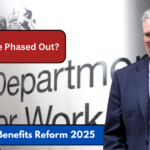The Department for Work and Pensions (DWP) has issued an important update for pensioners: all tax credits will stop by April 2025. This marks a major transition in the benefits system, as claimants will need to migrate to Universal Credit or Pension Credit to avoid losing their payments.
If you’re currently receiving tax credits, it’s essential to act promptly to secure your benefits. Here’s everything you need to know about this shift, who it impacts, and what steps to take.
Why Are Tax Credits Ending?
This change is part of the government’s broader plan to simplify the benefits system. Tax credits will be phased out entirely, with Universal Credit and Pension Credit taking their place. While most pensioners have already made the switch, some individuals remain on tax credits.
The DWP has warned that if you don’t transition by the specified deadlines, your payments will stop. This could leave vulnerable pensioners at risk of financial hardship if they miss the critical deadlines.

Who Is Affected?
Pensioners currently receiving tax credits are the primary group affected. Here’s what you need to know:
- Deadline for Payments: All tax credit payments will cease after April 5, 2025. If your situation changes before this date, your payments may end earlier.
- Notification Letters: The DWP or Northern Ireland’s Department for Communities will send letters to affected individuals with specific instructions.
- Eligibility Check: Not everyone will qualify for Universal Credit or Pension Credit, so it’s crucial to verify your eligibility and act accordingly.
What Are Universal Credit and Pension Credit?
- Universal Credit: A streamlined benefit combining several payments, including tax credits. It supports those of working age, but some pensioners may qualify depending on their situation.
- Pension Credit: Specifically designed for pensioners, this benefit boosts state pensions and provides access to additional financial support, such as:
- Discounts on utility bills.
- Free TV licenses for those over 75.
- Access to additional payments worth up to £10,000 annually.
Steps to Take
To ensure a smooth transition and avoid losing benefits, follow these steps:
- Check Your Mail: Watch for notification letters from the DWP. These letters will outline your next steps and deadlines.
- Act Quickly: Don’t wait until the last minute. Apply for Universal Credit or Pension Credit as soon as possible after receiving the letter.
- Seek Guidance: If you’re unsure about your eligibility or how to apply, contact the DWP or a local support organization for help.
- Keep Documentation Ready: Ensure you have all necessary documents, such as proof of income, state pension details, and identification.
Risks of Missing the Deadline
Failing to transition before the deadline can have serious consequences:
- Loss of Payments: Tax credit payments will stop, leaving you without financial support.
- Delayed Benefits: Applying after the deadline could delay your access to Universal Credit or Pension Credit.
- Missed Opportunities: Pension Credit provides additional financial benefits that you could lose if you don’t act promptly.

Why This Change Matters
The government aims to make the benefits system more straightforward and efficient with this transition. However, it also means pensioners must stay informed and proactive. Missing deadlines could lead to unnecessary financial strain, particularly for those already struggling with the cost of living.
Conclusion
Pensioners receiving tax credits must take action to transition to Universal Credit or Pension Credit before April 2025. Don’t delay—check your eligibility, follow the instructions in your notification letter, and apply early to avoid disruptions. By staying informed and prepared, you can ensure continued financial support.
This article has been carefully fact-checked by our editorial team to ensure accuracy and eliminate any misleading information. We are committed to maintaining the highest standards of integrity in our content.
Filza specializes in simplifying financial topics for everyday readers. Whether breaking down Canada’s tax guides or U.S. benefits like SNAP and VA Disability, Filza’s relatable writing style ensures readers feel confident and informed. Follow her insights on LinkedIn or reach out via email at shewrites.health@gmail.com.









